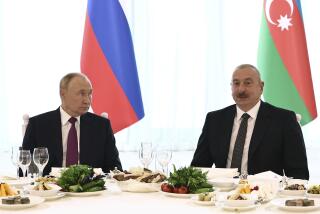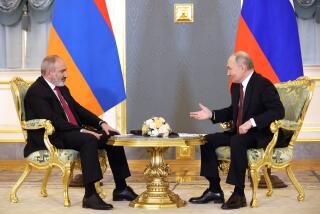Gorbachev, Afghan Chief Confer on Soviet Pullout
- Share via
MOSCOW — Soviet leader Mikhail S. Gorbachev traveled to Soviet Central Asia on Wednesday for a meeting with the Afghan president apparently designed to clear away the last hurdles blocking the start of a Soviet troop pullout from Afghanistan.
Tass, the official Soviet news agency, said Gorbachev arrived in Tashkent, capital of Soviet Uzbekistan and only 200 miles from the Afghan border, where he was later joined by President Najibullah of Afghanistan and Soviet Foreign Minister Eduard A. Shevardnadze.
The brief Tass dispatch gave no details about the talks, speaking obliquely instead about the economic development of Uzbekistan. But there was immediate speculation that Gorbachev had traveled there to take charge of the deliberations surrounding the withdrawal of the estimated 115,000 Soviet troops in Afghanistan, where Muslim guerrillas have been battling the Soviet-backed government for more than eight years.
Shevardnadze had been in Kabul, the Afghan capital, for the past three days discussing a proposed settlement with Najibullah. Gorbachev apparently chose to see Najibullah in Soviet territory for safety reasons, since Kabul is sporadically rocketed by the guerrillas. The guerrillas also have used U.S.-made Stinger missiles to shoot down planes in Afghanistan.
Radio Kabul said Najibullah would have a “short discussion” with Gorbachev but gave no details.
Indirect U.N.-sponsored talks are under way in Geneva between the Soviet-backed Afghan government and Pakistan on withdrawal of Soviet troops, return of Afghan refugees to their homeland and other matters. The Soviets invaded Afghanistan in December, 1979, to prop up the country’s Marxist regime, but Gorbachev has recently called the Soviet presence there “a festering sore.”
Progress at Geneva has been stalled by Washington’s insistence on “symmetry”--that any cutoff in U.S. aid to the country’s Muslim guerrillas be accompanied by a parallel suspension of Soviet military aid to the Kabul government.
Shevardnadze, who discussed Afghanistan with Reagan Administration officials during a visit to Washington last month, rejected the American insistence on symmetry and said the United States had reneged on an earlier promise.
The Soviets have said that they will proceed with the troop withdrawal unilaterally, even without a formal peace agreement. Soviet Deputy Foreign Minister Vladimir F. Petrovsky confirmed at a news conference in Moscow that Shevardnadze and Afghan leaders are discussing “a number of variants” for a withdrawal outside the framework of a U.N.-mediated accord in Geneva.
The Afghan government reportedly is reluctant to have the Soviets depart while American aid continues to flow to the Muslim rebels, or moujahedeen, based in neighboring Pakistan.
But Petrovsky said the Kabul government has agreed to the Soviet proposal for a unilateral withdrawal if the Geneva talks are not successful.
“Our position has been fully discussed and is in full accord with that of the Afghan government,” he said. “Our positions have been agreed upon.”
The Soviets had previously agreed to bring home about half of their troops in Afghanistan in the first three months and to complete the operation in another six months. But the seeming impasse at the Geneva talks may lead Moscow to change that timetable.
The Soviets are reportedly eager to begin the withdrawal before the summit meeting between Gorbachev and President Reagan, beginning May 29 in Moscow.
Meanwhile, Secretary of Defense Frank C. Carlucci arrived in Islamabad, the Pakistani capital, to discuss arms supplies for the Afghan rebels as well as U.S. military assistance to Pakistan.
U.S. Assistant Secretary of State Michael H. Armacost, who has been the Reagan Administration’s trouble-shooter on Afghanistan, joined Carlucci for the talks.
More to Read
Sign up for Essential California
The most important California stories and recommendations in your inbox every morning.
You may occasionally receive promotional content from the Los Angeles Times.










